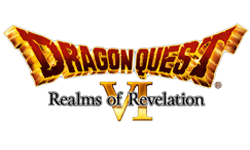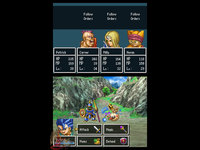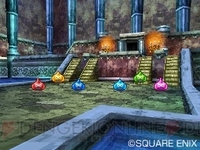|
|

|
PLATFORM
|
DS
|
BATTLE SYSTEM
|

|
INTERACTION
|

|
ORIGINALITY
|

|
STORY
|

|
MUSIC & SOUND
|

|
VISUALS
|

|
CHALLENGE
|
Easy
|
LENGTH
|
40-60 Hours
|
|
OVERALL

|
+ Skills kept on vocation change
+ Tons of great party chat dialogue
+ Lots of vocations to choose from
- Job system does not allow for experimentation
- Story and characters see no development
- Lots of useless skills
|
Click here for scoring definitions
|
|
|
Dragon Quest VI: Realms of Revelation for the Nintendo DS is the final game in the Zenithia trilogy. After fifteen years, a publisher change, and a subtitle revision, the final Dragon Quest holdout is now available in English. Now that RPGamers have it in hand, was it worth the wait or were we not really missing out on anything special?
Anyone familiar with the Dragon Quest series will be instantly at home with the mechanics in place here. Battles are standard turn-based affairs where players must make the most of their skills or be sent back to the nearest church with half their gold missing and their tail between their legs. One thing that stands out about this game is the vocation system which offers a lot of different jobs and skills to select, but in practice it is not the most flexible of features.
Players will need to be careful with their selections, as advanced jobs are only unlocked after two specific basic jobs have been mastered for a character. For example, players wanting to create a gladiator must master both the warrior and the martial artist vocations. This means fighting 350 battles total: 150 as a warrior and 200 as a martial artist. Even after all that, the job is not unlocked for all characters, only the one that met the requirements. And to see how much more progression is required, players must traverse all the way back to Alltrades Abbey just to check the status. Not only that, but areas are level capped to keep players from grinding against simple enemies. While the rationale for doing this is a means of forcing progression, it's another frustration of the job system. All in all, the job system is a great idea that is completely hampered by too many restrictions.
 Classic DQ gameplay.
Classic DQ gameplay.
|
|
The pacing of the game means that in a straight-forward playthrough, it is likely that only one advanced job per character will be unlocked without lots of extraneous fighting. This is problematic because, until they've been used, it's hard to tell which jobs and skills are useful. This means getting stuck with an unwanted job will take many hours of extra work to obtain another one, in some cases requiring mastering two more vocations just to access the desired one. Thanks to this, there is little room for experimentation. Despite these problems, it is nice that skills earned are kept even after a vocation change, so by the end of the game characters should have a flood of abilities to pick from, though even that can be overwhelming.
Usually, a Dragon Quest game can be saved from its static gameplay with a solid, charming story. Sadly, this is not the case here. While the localization and party chat dialogue is fantastic and pun-filled, the story is a disappointment. The plot will have players jumping back and forth between parallel worlds and at times it's difficult to tell the difference between the two or to care for either. The characters have great lines and lots of personality, but in the long run they go nowhere. There is little to no development for them, and it's quite a shame. Characters like Terry, the stoic fighter, and Ashlynn, the mysterious mage, could have been great, but end up falling flat. Carver, the brutish fighter, and Amos, the old warrior, end up being the most entertaining of the bunch just due to their dialogue. The fact that there is a new line of dialogue for party members after each NPC interaction is just mind-blowing, and the dialogue is great, but it never really goes deep enough to matter.
The story does little to help the characters, as the game is divided into vignettes and most are fairly simplistic. Again, there is plenty of potential, but it's never fulfilled. There are a few quests that do a decent job with storytelling, but too many are just overly curt, consisting of a simple quest and its quick resolution. The main story does little to salvage this situation, as the villains are shallow and haphazardly introduced. The game lacks narrative focus, and most of the time it feels more like little pieces of the scenario were tossed into a bag and shaken, preventing anything cohesive from being produced.
 Culturally diverse, offering slimes of all colors.
Culturally diverse, offering slimes of all colors.
|
|
Visually, Dragon Quest VI holds up every bit as well as the rest of the DS trilogy. The 3D environments are decent and the artwork is solid, complete with new enemies and wonderful character designs. Some of the town designs are unique, adding a bit of flavor to an otherwise bland experience. The soundtrack is not extremely memorable, but serves the game well enough. The presentation is a quality effort, but not groundbreaking or exciting in any way.
Fans of Dragon Quest should know what they are getting into here. Sadly, this game lacks much of the charm and cohesiveness of the rest of the series. The game drags on far too long, especially considering that the plot goes nowhere. The job system makes for a nice change of pace, but is too rigid to be enjoyable. The lively characters and bountiful party chat don't make up for the lack of a cohesive story. Dragon Quest VI falls short in most every area except localization, but it still has the solid gameplay foundation so many fans of the series expect. Despite that, it's just lacking in too many areas to be considered a quality product.
Review Archives
|









